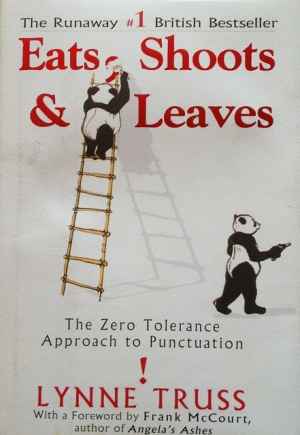


The first American edition, fourth impression. A signed and excellent first edition copy of this popular book on grammar by former editor Lynn Truss.

Amid the contradictions and dodgy rulings, there's plenty of helpful stuff for people who really aren't sure where to stick their dash or how to tell the difference between a long, dead snake and a long-dead one.ĭignall wisely says of the Oxford comma "the choice is yours", and she is not as prescriptive as she seems – although it is a bit confusing to learn all the rules, do the exercises and complete the "punctuation workout", only to be told at the end: "Punctuation is, when push comes to shove, subjective." If only she'd said that sooner.Ĭan You Eat, Shoot & Leave?, by Clare Dignall, is published by Collins (£7.Cloth. Dignall writes with a pleasing light touch and some of the jokes would be worthy of La Truss herself. And a section on the "double possessive" left me genuinely baffled (for some reason "she was a former girlfriend of the prince" is wrong). Having rightly steered us away from the dreaded greengrocer's apostrophe, she suddenly presents us with p's and q's, and the grotesque no's (rather than noes) as the plural of no. Thus in the apostrophe chapter we are told it's Mars' and Venus' for the possessive of the ancient gods, but Mars's for the planet and Venus's for the tennis player, and it's Dickens's, but Jesus'. OK, we all make mistakes, but a bigger problem is that many of Dignall's rulings are dubious, and some absurd. So barely three pages into the first chapter we find a "forego" (she means forgo) and, worse, "David Lloyd-George" (sic) is cited as an example of a hyphenated proper name. It's always tempting to point out the mistakes in such a book, so I will (it's known as Muphry's law, from which Guardian Style is not, alas, immune: "If you write anything criticising editing or proofreading, there will be a fault of some kind in what you have written").


 0 kommentar(er)
0 kommentar(er)
